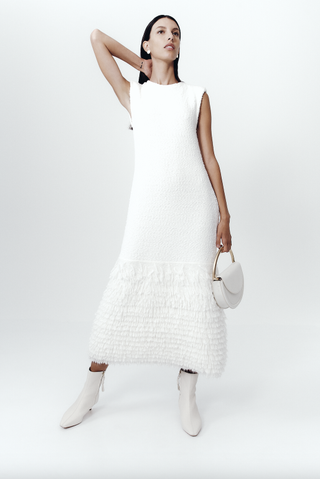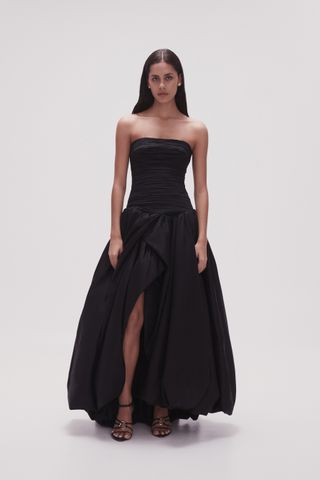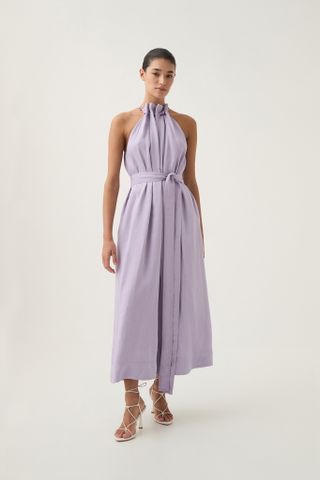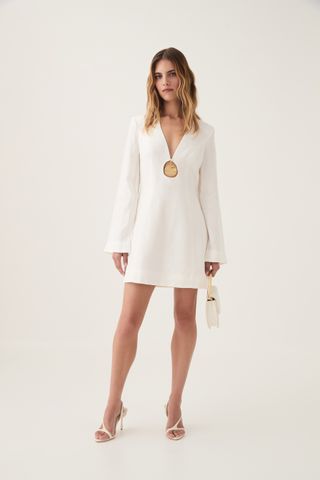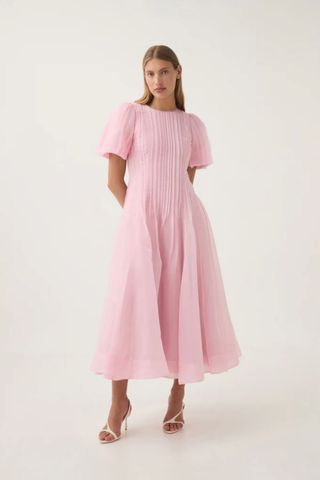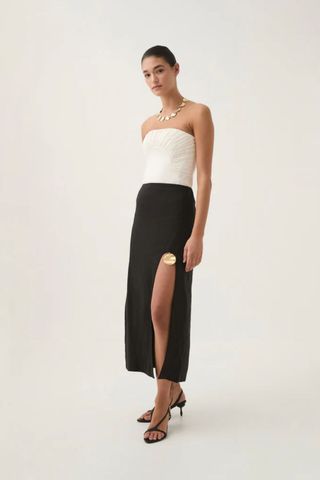Since launching her Australian label Aje in 2008, Co-Founder and Creative Director Edwina Forest has built a global fashion brand with a very loyal customer. The brand’s signature aesthetic that encapsulates the Australian way of life, mixing city living with a relaxed coastal sensibility has resulted in 15 years of growth and success. As part of our Women Who Win series, I caught up with Edwina to ask what her biggest challenges have been growing an independent fashion label, balancing creativity with commercial demands and the importance of celebrating successes along the way.
(Image credit: Edwina Forest, Aje’s Co-Founder and Creative Director)
How would you describe the brand?
I began the business 16 years ago with my best friend and business partner. At the time it was a way to bridge this increasing divide between coastal and urban fashion that was very much existing within the Australian landscape—a relaxed coastal sensibility. These pieces can live, breathe and exist in an inner city landscape but they have to travel well, transcend spaces and live on for a long time.
Your dresses require minimal styling. Was that intentional?
We loved the idea that you could wear the pieces exactly as they are, without feeling you have too much to add. It’s always been a constant consideration that we find this delicate balance between this sense of adornment and a relaxed effortless sensibility so that the pieces can transcend either day or night – depending on how you accessorise them.
What is your favourite piece?
The dimension knit midi dress—part of the current collection—depicts where we are now. As the name suggests it’s a knitted dress with a very slim, clean line plus a lot of detail at the bottom. It’s beautiful because it’s about the meeting point of form and functionality, something I think is important in today’s world—especially for modern working women. We have so many places to go and so much to do and, to me, it’s important that these pieces take us everywhere and that we can feel comfortable in them.
…it’s also been a constant consideration that we find this delicate balance between this sense of adornment and a relaxed effortless sensibility.
What has been the biggest challenge for you as a founder?
It’s been such a long journey and I think the combination of creativity and commercial acumen is a juggle. Navigating the commercial space and growing a business has been one of the largest obstacles but also one of the most rewarding because I often have to pivot and evolve. So much is constantly changing but you get a grasp of how commerce and creativity can all coexist together. In essence, we all want to create magical beautiful pieces, but they also need to be sold and to have a reason to exist. The customer has to actually have a desire and a need for them.
What is one thing you’d never compromise on when it came to your business?
Definitely creativity. I don’t think we have ever compromised on that and the brand essence in general. You have to evolve with the times but design is always at the core of everything we do. It’s a delicate dance, with a deep respect for our consumer and how she’s feeling and behaving and what she’s ultimately wanting.
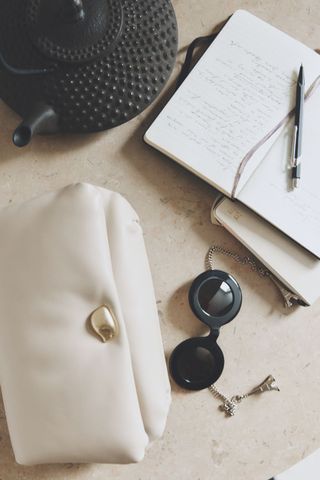
(Image credit: Edwina’s office)
How do you celebrate success?
In the earlier days, it was a little easier to find ways to celebrate. I think there was a little bit more time to consider things and there weren’t so many collections to be created each year. The shows for me are always a huge moment and as a team, we always find time to celebrate. They’re over so quickly, but there’s so much involved in the design process and the orchestration of the event in general. It’s really important afterwards to have time to discuss what transpired with people who have been part of the process.
How can you achieve the right work/ personal life balance?
I read this quote that life is not about a journey for happiness. It’s a journey for consciousness. We’re constantly evolving and I don’t think we ever get to this point where everything is all worked out. But in terms of how the business has been able to structure and the size that it’s at, we’re constantly having to pivot, evolve and restructure to find the best balance for everything within the company. I think we’ve been very good at getting an amazing team of support around us and allowing everybody to work together on a grand vision, but also to work independently—that feels good.
We have so many places to go and so much to do and I think it’s important that these pieces can take us everywhere and that we can feel comfortable in them.
What has been your biggest challenge to date?
There have been many but it’s how we look at them—they don’t always have to be a negative thing. Sometimes it can seem that things are almost an overnight success but with us, it hasn’t been as fast as it seems. It probably took until the 10-year point for us to feel quite organised. We’ve financially done everything ourselves without external investment, so everything had to be done in stages. It allowed us, or made us, have a lot of discipline as we had to be prudent and strategic with everything. I give a lot of kudos to my co-founder and business partner Adrian because at one point we were both floundering creatives but then he really learned the business side and has become a wonderful CEO.
And what are the lessons that you’ve learned?
One of the hardest lessons was how to get the business to function as we’re a vertical business and a wholesale business at the same time. And I think what a lot of people don’t understand about fashion, is that it’s a complicated business. We produce something, we also sell a service. We do so many different things and they all have to coexist together under a beautiful brand banner where everything on the surface always seems so shiny.
Have you ever felt discriminated against as a female founder? And if so, how or what would you want to change for women in business?
I’ve been very fortunate in that I haven’t felt discrimination personally, but I feel like it is still very much an evolution of allowing women to feel the power that we innately have within a workforce. I think that within the business realm, the idea of masculinity still drives that sphere. As women, we have to learn that our voice doesn’t have to be loud to be strong. I have learnt that I could have a lot of power in being quiet or in not saying too much—that you can lead with a soft touch. I suppose that’s been my greatest learning.
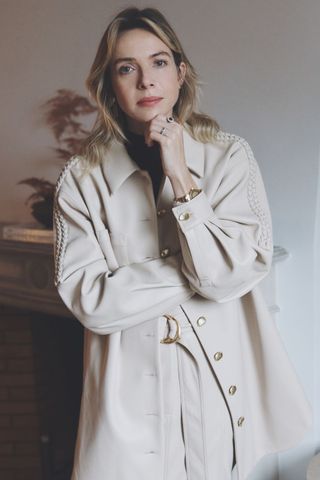
(Image credit: Edwina Forest, Aje’s Co-Founder and Creative Director)
Aje is an official signatory of the UN Global Compact. How easy is it to be sustainable and what advice do you have for independent designers starting their businesses now?
I think it’s much easier to be sustainable now because there have been a lot of technological advancements that we didn’t have at the beginning. I remember when we began looking into the idea of organic cotton and organic dyes, they were few and far between. At the time the technology barely existed. So whilst I think that it’s easier from that perspective, it’s definitely still expensive because everything is still new. We’ve really had to evolve and almost backtrack in certain ways which when you’ve got a big machine is harder and becomes a lot more costly to do.
I read this quote that life is not about a journey for happiness. It’s a journey for consciousness.
What is the best piece of advice you’ve ever received?
I wish there was one mantra that I always had, but I feel like they are constantly evolving as business and life evolve. I’ve always loved the saying ‘shoot for the moon and you’ll land on the stars.’ It teaches you to dream big, but also that if you don’t quite get there, other amazing things happen along the way and can take you on a different journey. I think that’s powerful.
What is your superpower?
Someone once said to me that I was a very maternal leader. At the time I didn’t understand and I thought it was just because I’d had my first child. But, what they meant was I lead in a very kind nurturing and empathetic way. I guess I am very proud to own that space and I was very grateful for that compliment. I think we all need softness and nurturing from time. I wasn’t brought up with an iron fist and I was grateful for that. My family was always very nurturing, supportive, empathetic and guiding. I think that I’ve harnessed that within myself and I hope that’s what other people within my business and my wider community feel from me.
What are your favourite places to visit in London?
I’ve not had the luxury of being in London for long enough, as when I’m there I’m always working, but I think the fashion is just extraordinary. I love the heartbeat and the energy, of the city, because it’s so unique. I feel like everybody expresses their individuality. It’s so diverse and I think in Australia we’re still working on that. London has so much history and so many mixes of culture and feels like a melting pot—it’s amazing.


